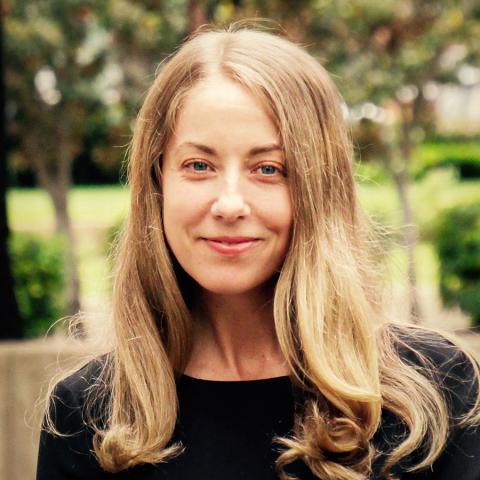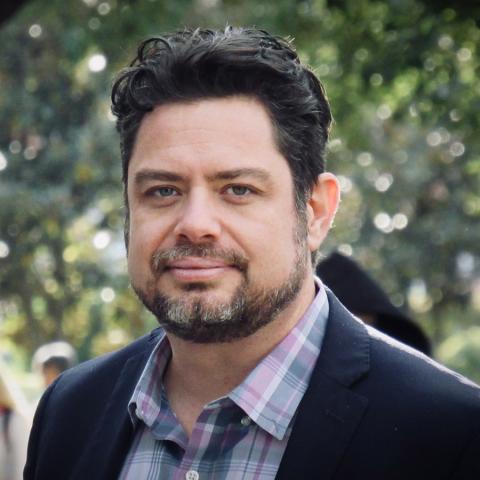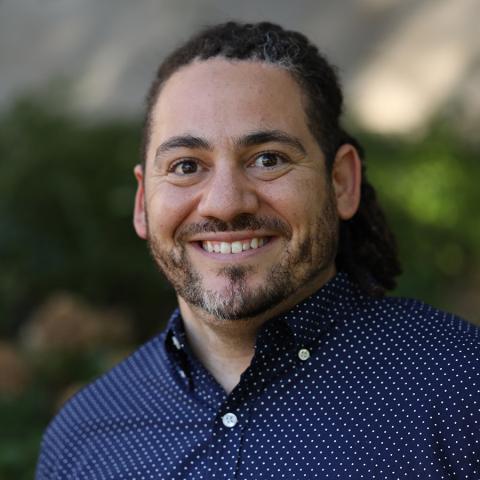Baylor's Poets
Three young faculty members are keeping the tradition of poetry appreciation alive on campus.
A testament to Baylor’s enduring commitment to teaching and celebrating poetry, the Armstrong Browning Library (ABL) contains the world's largest collection of books, letters and artifacts pertaining to 19th-century poets Robert Browning and Elizabeth Barrett Browning. This grand, three-story building located at the southeast corner of campus was also a memorable tour stop for each of three scholar-poets before they joined the English department faculty: Dr. Jacob Shores-Argüello, Dr. Chloe Honum and Dr. Ryan Sharp.
“There is something in the water about poetry being important at Baylor,” said Shores-Argüello, assistant professor of English. “It has something to do with the Armstrong Browning Library, the Beall Poetry Festival — I don’t know exactly. Poetry is important here, and there’s just a night-and-day difference compared to other places where I’ve taught.”
Indeed, Baylor upholds a very long tradition of hosting renowned poets — a tradition that pre-dates the ABL and, by decades, the annual three-day Beall Poetry Festival.
“During his four-decade tenure as English department chair, Dr. Andrew Joseph “A. J.” Armstrong not only established the Browning collection that would later become the ABL, he brought numerous poets to Waco for readings, including such luminaries as W. B. Yeats, Robert Frost, Amy Lowell, John Masefield, Harriet Monroe, Alfred Noyes, Carl Sandburg and Edna St. Vincent Millay,” Dr. Kevin Gardner, English department professor and chair, said. “I don't know for certain that we have an inherently stronger connection to poetry than other English departments, but it certainly seems that way.”
Honum remembers walking into Carroll Science Hall (home to the English department) for the first time and noticing the framed broadsides from contemporary poets who have participated in the annual Beall Poetry Festival.
“They’re prints of poems by each of the participants — one poem each,” Honum said. “I'll stop and read a poem and know that this poet was here. They came to Baylor and read. I remember being really struck by that, and I always encourage my students to stop and read some of those poems and know that those poets spent time here.”
An award-winning poet herself, Honum’s work has appeared in The Paris Review, Poetry and The Southern Review. She is the author of Then Winter (Bull City Press, 2017) and The Tulip-Flame (Cleveland State University Press, 2014); and she has received numerous residencies and fellowships, including the 2019 Grimshaw Sargeson Fellowship — New Zealand’s most prestigious writing fellowship. Raised on the North Shore of Auckland City, New Zealand, Honum returned to her hometown in spring 2019 to spend four months focused on a manuscript in progress.
“I actually feel moreso like a New Zealander as I get older and as the years accumulate living in the States,” Honum said. “Both my parents were born and raised there and my dad's side represents six generations of New Zealanders. I grew up there, so New Zealand is the setting for all of my childhood memories.”
She teaches courses in contemporary American poetry and leads creative writing workshops focused on the craft of poetry, wherein students read one another’s work and offer verbal critique in class.
“I encourage my students to explore poetry as a space of wonder, permission and possibility,” Honum said. “As a professor, I get to talk about poems I love, and I hear what the students love, and I hear them talk about their own poems. I just get to sort of swim in poetry every day.”
Baylor students, Honum said, are uniquely willing to take risks with their writing and to encourage one another in the endeavor of writing and sharing their work with others.
“They’re wonderfully dedicated and open to trying things in their work, and they've been really supportive of one another,” she said. “I think the sense of community they enjoy outside the classroom — they bring that into the classroom, too. They really take a lot of care with one another's work.”
Like Honum, Shores-Argüello leads workshops in poetry as well as prose writing; and he has noticed the same “coming togetherness,” among his students.
“Baylor students, I think, are much more willing to be open and listen to one another in a way that I have not seen elsewhere,” he said. “If there are things my students feel they can't express because the culture is not ready to hear them, I want them to know that poetry is more than ready to hear them. Poetry is desperate to hear a multiplicity of voices.”
Having grown up between Costa Rica and the United States, Shores-Argüello recognizes a self-same “torn” quality in many of his students — if not between physical places, then a division within.
“I think we're all torn between one country, or another, or between two places inside of us, even if you’ve never left your home state,” he said. “It's really hard to see yourself out there in the world, but I feel that poetry provided that ability for me. That's the main reason why I teach, and it's something that I want to be able to offer for them.”
Shores-Argüello’s work has been featured in The New Yorker magazine, Poetry, Guernicaand The Oxford American. Like Honum, he leads creative writing workshops at Baylor and has received numerous fellowships and awards. Shores-Argüello’s second book Paraíso, written in the aftermath of his mother’s death, won the inaugural CantoMundo Poetry Prize in 2017. CantoMundo celebrates and supports the work of Latinx poets writing in English.
“Paraíso is about my mother's death and about my connection with Costa Rica and the idea that there aren’t really borders between places, especially if you grow up between two countries,” he said. “I think [Paraíso] formulated as a book only after I had distance from [my mother’s] death and from the place — psychological distance, of course, but also physical distance is something that's important.”
Most recently, Shores-Argüello was selected as a 2020 CantoMundo Poetry Fellow — one of 13 selected from 120 applications. A lifelong fellowship, this award specifically provides funding to attend a series of consecutive summer conferences held at the University of Arizona Poetry Center, and thus, time and space to generate new work alongside other artists.
Re-examining Reality
Assistant professor of English, Ryan Sharp, teaches courses in African American and American literature. His academic research has centered on African-American persona poetry, and his own poetry has appeared in a number of literary journals. His first poetry chapbook is my imaginary old man: poems(Finishing Line Press, 2017).
“It’s hard to analyze my own poetry, but a friend of mine told me that she felt like the poems in my imaginary old man are about a desire for relationship or an aspiration for a relationship that either wasn't had or could have been different,” said Sharp, who is a father of young children, himself. “I think while writing them, I evolved or matured as a father. I got deeper into my own experiences as a father, and that informed my imagining of this ‘old man.’ My actual fatherhood and this imagined fatherhood informed one another.”
In class, Sharp works to challenge his students to look closely at their own realities — their ideas about what is “real” — and their basis or foundation.
“A novel like Beloved, by Toni Morrison, which I teach in my American literary cultures course, that’s a work of fiction that's based on true events — but it very much allows us to engage with the material realities of chattel slavery,” Sharp said. “I want [my students] to understand that poetry, short stories and novels allow us access to a variety of very real experiences — realities that otherwise we wouldn't have access to.”
In addition to learning about other cultures and experiences outside one’s own, Sharp says reading and analyzing literature offers the opportunity to learn about ourselves.
“In that sense, I feel like the practice of reading and writing is important in developing our full self,” Sharp said. “And then, these practices help to develop students’ critical thinking.”
While teaching and researching African American and American literatures may not routinely afford hours on end to work on his own creative projects, Sharp says it’s all exercising the same muscle. And, moreover, not all poets work most efficiently with vast expanses of time to create.
“I know it works differently for different folks but when I'm in a class talking about poetry, I feel like it feeds my creative poet self as well as my critical self,” he said. “That's how it functions for me. I’ve talked with a lot of poets and everyone has different approaches. Some writers need a lot of time, some don't need to write daily and some like to let that energy build up and then indulge in like a big binge writing session. I just try to adapt to current realities and write.”
Poetry for Everyone
Notably, the students who fill Sharp’s literature courses, or Honum’s and Shores-Argüello’s workshops, aren’t just English or professional writing majors. Instead, their class rosters represent a variety of disciplines and career ambitions.
“It’s wonderful because pre-med students, aviation science majors, business majors — everyone brings such different perspectives,” Honum said.
Several of the most celebrated modern poets cultivated alternate careers. The much-anthologized William Carlos Williams enjoyed a long career as a physician; and Wallace Stevens, whose Collected Poems won the Pulitzer Prize for Poetry in 1955, spent most of his life working as an executive at an insurance company.
“I have a lot of different majors in my classes and I like to challenge them to think about why poetry is important to them,” said Shores-Argüello. “So our final project is, ‘Tell the class how poetic thinking has influenced this other thing that you do in your life.’
“I'll have medical students, who are working on research, present on the value of metaphor and how you can’t interact with patients without understanding metaphor. Asking patients to point to a pain scale — How much pain do you have from one to 10? — my pre-med students realize the poetic thinking that happens whenever you're pointing at these faces on the wall chart.”
Studying poetry, says Shores- Argüello, can help hone the kind of thinking that will serve students pursuing other disciplines.
“Beautiful code and beautiful poetry are almost the exact same thing,” he said. “Trying to get the most important information or effect across with as few resources as possible.”
No matter her students’ career paths, or whether they write another poem after graduation, Honum hopes her students leave with a well-trained ear.
“I think something all students take with them is a kind of deep listening — a deeper way of listening to both themselves and others,” she said. “My hope is that they’re listening and digesting and responding to a voice or perspective that is new or that is different from their own; and that they learn to respond to it, appreciate it and be present with it.”


